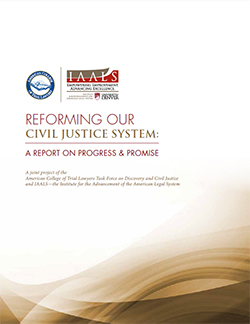Efficient and Accessible Courts: 24 Recommendations for Improving Civil Justice
 Denver, Colo. – In 2009, national media outlets—and the legal profession—were abuzz with talk of concrete, reasoned, and achievable recommendations for making the American civil justice system less time consuming and expensive, while also more accessible and just. The New York Times, the Wall Street Journal, Corporate Counsel, and many others trumpeted the efforts of IAALS—the Institute for the Advancement of the American Legal System—and the American College of Trial Lawyers (ACTL) Task Force to improve the way our legal system functions not only for lawyers and judges, but for litigants and clients. The recommendations took the form of 29 Principles for achieving landmark reform in our courts, and sent ripples across our civil justice system, at both the state and federal levels.
Denver, Colo. – In 2009, national media outlets—and the legal profession—were abuzz with talk of concrete, reasoned, and achievable recommendations for making the American civil justice system less time consuming and expensive, while also more accessible and just. The New York Times, the Wall Street Journal, Corporate Counsel, and many others trumpeted the efforts of IAALS—the Institute for the Advancement of the American Legal System—and the American College of Trial Lawyers (ACTL) Task Force to improve the way our legal system functions not only for lawyers and judges, but for litigants and clients. The recommendations took the form of 29 Principles for achieving landmark reform in our courts, and sent ripples across our civil justice system, at both the state and federal levels.
“Over the past five years, numerous pilot projects around the country have tested alternative rules and procedures for civil cases in line with these Principles,” said Paul Saunders, Chair of the ACTL Task Force on Discovery and Civil Justice that helped propose them. “We have made great progress, but there is still much work to be done. These tests have informed our new, final recommendations, which should serve as a guidepost for reform nationwide.”
Now, these 24 revised Principles lay the foundation for achieving fundamental improvement of our system to help ensure that no one is shut out due to a lengthy and expensive process. The recommendations are defined in the new publication Reforming Our Civil Justice System: A Report on Progress and Promise, and include calls for a sharp realignment of the discovery process and greater court resources to manage cases.
- The “one size fits all” approach to trying cases is not optimal; the process appropriate for one case is not necessarily the process appropriate for another case. Both court rules and judicial case management strategies should reflect that reality.
- Effective case management by judges is critical to each case, ultimately saving the parties time and money, and leading to more informed and reasonable resolutions. Management should be tailored to the needs of the case.
- To accomplish this greater involvement by judges, courts need more resources. Where judicial resources are in short supply, those resources should be increased to allow courts and judges to work more efficiently and effectively.
- Proportionality is reaffirmed to be a guiding principle for all discovery. This is a consistent theme across the country and a significant aspect of the proposed amendments to the federal rules of civil procedure.
“When the first recommendations were released, we called for a dialogue. We now call for action,” said Rebecca Love Kourlis, Executive Director of IAALS, the ACTL's partner on the project. “Great changes are underway already in some places, but our legal system and profession must unite around principles that can be extended nationwide, so that every court—and every litigant—will benefit. We believe these are those principles.”
Click here to download the report.
IAALS is a national, independent research center dedicated to facilitating continuous improvement and advancing excellence in the American legal system. Our mission is to forge innovative and practical solutions to problems in our system in collaboration with the best minds in the country. The Rule One Initiative identifies and recommends court processes and procedures that provide greater access, efficiency, and accountability.
The American College of Trial Lawyers is composed of the best of the trial bar from the United States and Canada and is widely considered to be the premier professional trial organization in America. Founded in 1950, the College is dedicated to maintaining and improving the standards of trial practice, the administration of justice, and the ethics of the profession. Fellowship in the College is extended by invitation only, after careful investigation, to those experienced trial lawyers who have mastered the art of advocacy and whose professional careers have been marked by the highest standards of ethical conduct, professionalism, civility, and collegiality.


